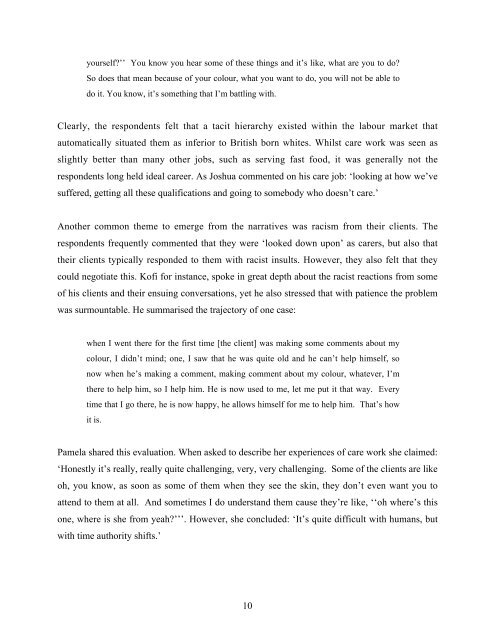Multiculturalism at work: The experiences of Ghanaians in London
Multiculturalism at work: The experiences of Ghanaians in London
Multiculturalism at work: The experiences of Ghanaians in London
- No tags were found...
You also want an ePaper? Increase the reach of your titles
YUMPU automatically turns print PDFs into web optimized ePapers that Google loves.
yourself?’’ You know you hear some <strong>of</strong> these th<strong>in</strong>gs and it’s like, wh<strong>at</strong> are you to do?So does th<strong>at</strong> mean because <strong>of</strong> your colour, wh<strong>at</strong> you want to do, you will not be able todo it. You know, it’s someth<strong>in</strong>g th<strong>at</strong> I’m b<strong>at</strong>tl<strong>in</strong>g with.Clearly, the respondents felt th<strong>at</strong> a tacit hierarchy existed with<strong>in</strong> the labour market th<strong>at</strong>autom<strong>at</strong>ically situ<strong>at</strong>ed them as <strong>in</strong>ferior to British born whites. Whilst care <strong>work</strong> was seen asslightly better than many other jobs, such as serv<strong>in</strong>g fast food, it was generally not therespondents long held ideal career. As Joshua commented on his care job: ‘look<strong>in</strong>g <strong>at</strong> how we’vesuffered, gett<strong>in</strong>g all these qualific<strong>at</strong>ions and go<strong>in</strong>g to somebody who doesn’t care.’Another common theme to emerge from the narr<strong>at</strong>ives was racism from their clients. <strong>The</strong>respondents frequently commented th<strong>at</strong> they were ‘looked down upon’ as carers, but also th<strong>at</strong>their clients typically responded to them with racist <strong>in</strong>sults. However, they also felt th<strong>at</strong> theycould negoti<strong>at</strong>e this. K<strong>of</strong>i for <strong>in</strong>stance, spoke <strong>in</strong> gre<strong>at</strong> depth about the racist reactions from some<strong>of</strong> his clients and their ensu<strong>in</strong>g convers<strong>at</strong>ions, yet he also stressed th<strong>at</strong> with p<strong>at</strong>ience the problemwas surmountable. He summarised the trajectory <strong>of</strong> one case:when I went there for the first time [the client] was mak<strong>in</strong>g some comments about mycolour, I didn’t m<strong>in</strong>d; one, I saw th<strong>at</strong> he was quite old and he can’t help himself, sonow when he’s mak<strong>in</strong>g a comment, mak<strong>in</strong>g comment about my colour, wh<strong>at</strong>ever, I’mthere to help him, so I help him. He is now used to me, let me put it th<strong>at</strong> way. Everytime th<strong>at</strong> I go there, he is now happy, he allows himself for me to help him. Th<strong>at</strong>’s howit is.Pamela shared this evalu<strong>at</strong>ion. When asked to describe her <strong>experiences</strong> <strong>of</strong> care <strong>work</strong> she claimed:‘Honestly it’s really, really quite challeng<strong>in</strong>g, very, very challeng<strong>in</strong>g. Some <strong>of</strong> the clients are likeoh, you know, as soon as some <strong>of</strong> them when they see the sk<strong>in</strong>, they don’t even want you to<strong>at</strong>tend to them <strong>at</strong> all. And sometimes I do understand them cause they’re like, ‘‘oh where’s thisone, where is she from yeah?’’’. However, she concluded: ‘It’s quite difficult with humans, butwith time authority shifts.’10
















